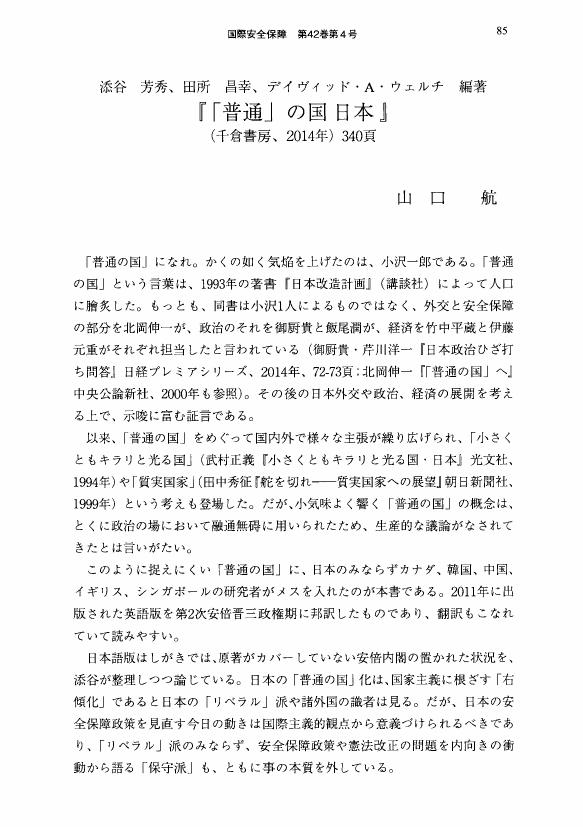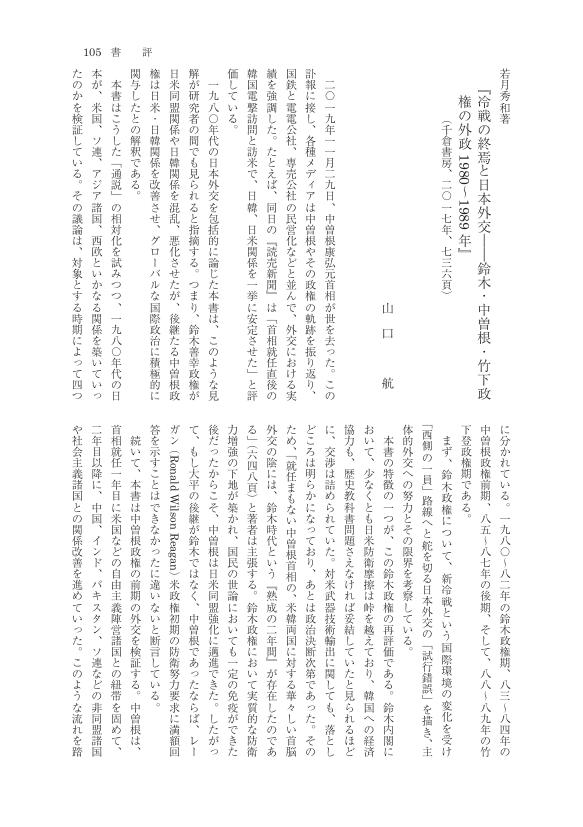2 0 0 0 都市は外交する――都市からの外交、都市への外交
グローバル化を背景として、国際政治における都市をめぐる外交の重要性が増している。本研究は、「都市からの外交」と「都市への外交」の2つの方向を軸として、①自律的プレイヤーとしての都市による外交の実態を把握し、②都市外交研究の基盤となる分析枠組を構築し、③国家を始めとする他のアクターとの相互作用を分析し、「都市」が世界政治で果たしつつある役割を明らかにしていくことを目指した。都市をめぐる外交を2つの方向から事例を研究し、都市の経済活動の結果ではなく、世界政治の構成要素としての「都市外交」研究を目標にした。本年度は、これまでの成果を踏まえた上で、「世界政治における都市外交」(潜在的役割の評価と政策提言)について研究を進めた。都市が今後「世界政治」のなかで発揮すべき役割について、検討をしていった。とくに①新しい「国際規範」の発信者としての都市と、②国連や地域機構と協力して紛争後地域の「平和構築」に貢献する都市の姿に着目をした。①については、国家主権の制限に必ずしもしばられない都市が、規範(新たな理念)の意識的な発信者として行動を活発化させれば、すでに実績があるNGOや多国籍企業を上回る影響力を発揮することが可能ではないかと予測した。②については、停戦監視や武装解除の初期段階ではなく、その後の自治機構の整備や地域コミュニティーの安定化に、都市が組織的に関与できる「国際制度」の構築を想定した。しかしながら、新型コロナウイルス感染症による国内外の情勢に影響を受けたため、国内外での資料の収集や、研究メンバーによる機動的な行動が困難となり、研究に遅れが生じた。
1 0 0 0 OA 添谷 芳秀、田所 昌幸、デイヴィッド・A・ウェルチ 編著『「普通」の国 日本』
- 著者
- 山口 航
- 出版者
- 国際安全保障学会
- 雑誌
- 国際安全保障 (ISSN:13467573)
- 巻号頁・発行日
- vol.42, no.4, pp.85-89, 2015-03-31 (Released:2022-04-07)
1 0 0 0 OA 新冷戦初期における紛争周辺国への援助 ――戦略援助の「発見」と「擬装」――
- 著者
- 山口 航
- 出版者
- 国際安全保障学会
- 雑誌
- 国際安全保障 (ISSN:13467573)
- 巻号頁・発行日
- vol.42, no.2, pp.69-85, 2014-09-30 (Released:2022-04-07)
- 著者
- 山口 航
- 出版者
- 一般財団法人 日本国際政治学会
- 雑誌
- 国際政治 (ISSN:04542215)
- 巻号頁・発行日
- vol.2021, no.202, pp.202_105-202_108, 2021-03-29 (Released:2022-03-31)
1 0 0 0 OA 総合安全保障の受容 ―安全保障概念の拡散と「総合安全保障会議」設置構想―
- 著者
- 山口 航
- 出版者
- 一般財団法人 日本国際政治学会
- 雑誌
- 国際政治 (ISSN:04542215)
- 巻号頁・発行日
- vol.2017, no.188, pp.188_46-188_61, 2017-03-30 (Released:2018-12-19)
- 参考文献数
- 88
The former Japanese Prime Minister Masayoshi Ohira established “the Comprehensive National Security Study Group” in 1979, which mainly consisted of Japanese leading scholars and government officials. However, the term “comprehensive security” was not invented by him, but was already well known to Japanese people at the end of the 1970s.Many previous studies have discussed the concept from various points of view. However, they have not explained in what ways policy-makers accepted it and regarded it as an integral factor in Japanese security policy.This study focuses on the impacts of comprehensive security on policy-makers, and especially the Ministry of Foreign Affairs of Japan, which was in charge of general security issues. It clarifies the situation in which comprehensive security appeared, explains what perceptions the ministry had of the concept, and shows how international and internal factors in those days influenced those perceptions, using declassified Japanese and U.S. government documents.It also pays attention to the different forms of security, focusing the discussion on the attempt to establish the “National Comprehensive Security Council” during the Zenko Suzuki Administration at the beginning of the 1980s. Comprehensive security did not simply comprise military security – i.e. security in the narrow sense – but also economic security, food security and others, i.e. security in the broad sense. At the same time, into comprehensive security was integrated anything that did not otherwise fall into the category of security.These elements contributed to jurisdictional disputes. The differentiation of security led other ministries and agencies to become concerned with security in a broader sense. For example, the Ministry of International Trade and Industry was interested in economic security, and the Ministry of Agriculture, Forestry and Fisheries, among others, was concerned with food security.At first, the Ministry of Foreign Affairs did not manifest interest in comprehensive security. Its main concern was security in the narrow sense because of an administrative dispute with the Japan Defense Agency. This study shows how it started to become involved in comprehensive security, and demonstrates what impact the differentiation of security had on ministries and agencies.Previous studies have regarded the Japanese government as a single actor, and have not revealed the differences between ministries and agencies. This paper demonstrates that for the Japanese government, the concept was not monolithic. Even though ministries and agencies were allied on the surface, they had different opinions and objectives. By investigating the acceptance of comprehensive security, this study aims to clarify the implications of this concept in the context of U.S.-Japan relations in the last phase of the Cold War.


